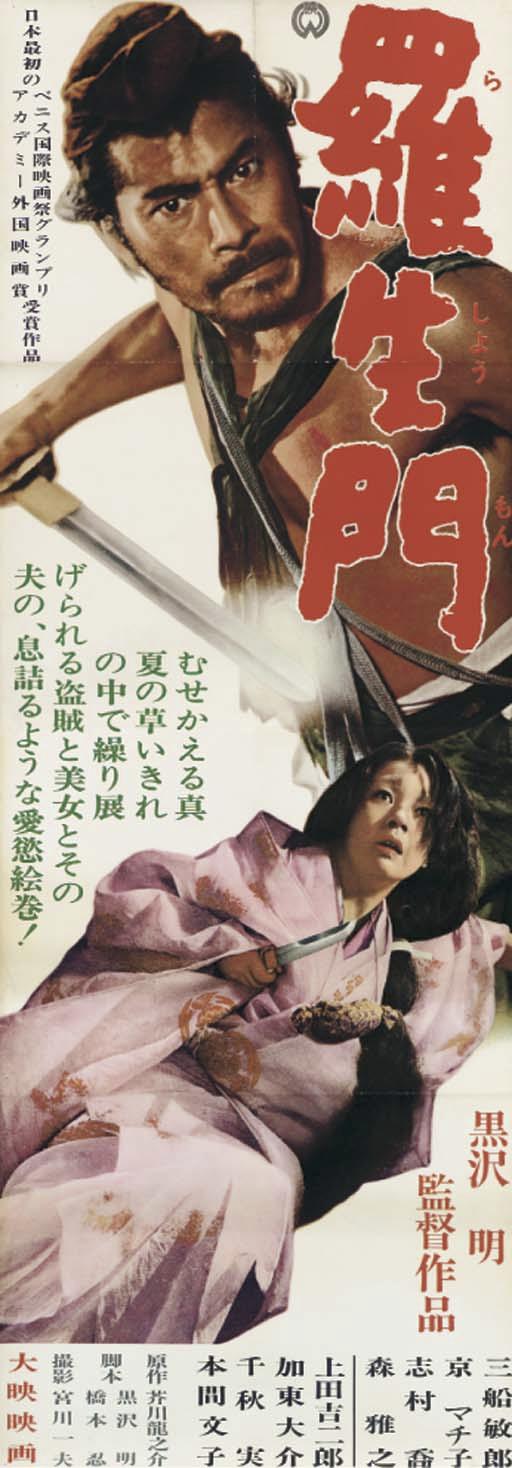
Director: Akira Kurosawa (1950, Japanese, 88 mins)
Reviews: RottenTomatoes (N/A), IMDB (8.4), Wikipedia, Amazon, Roger Ebert.
Watch online: YouTube.
Similar movies: crime, intense, suspense.
Summary: A landmark movie by Kurosawa in which four eye witnesses provide wildly varying accounts of the same incident which culminated in the death of a samurai. The film is notable for being the first to have such a plot. The movie ends without truth having been established.
The movie evokes questions about the nature of truth, memory and self image when recalling events. A good movie!
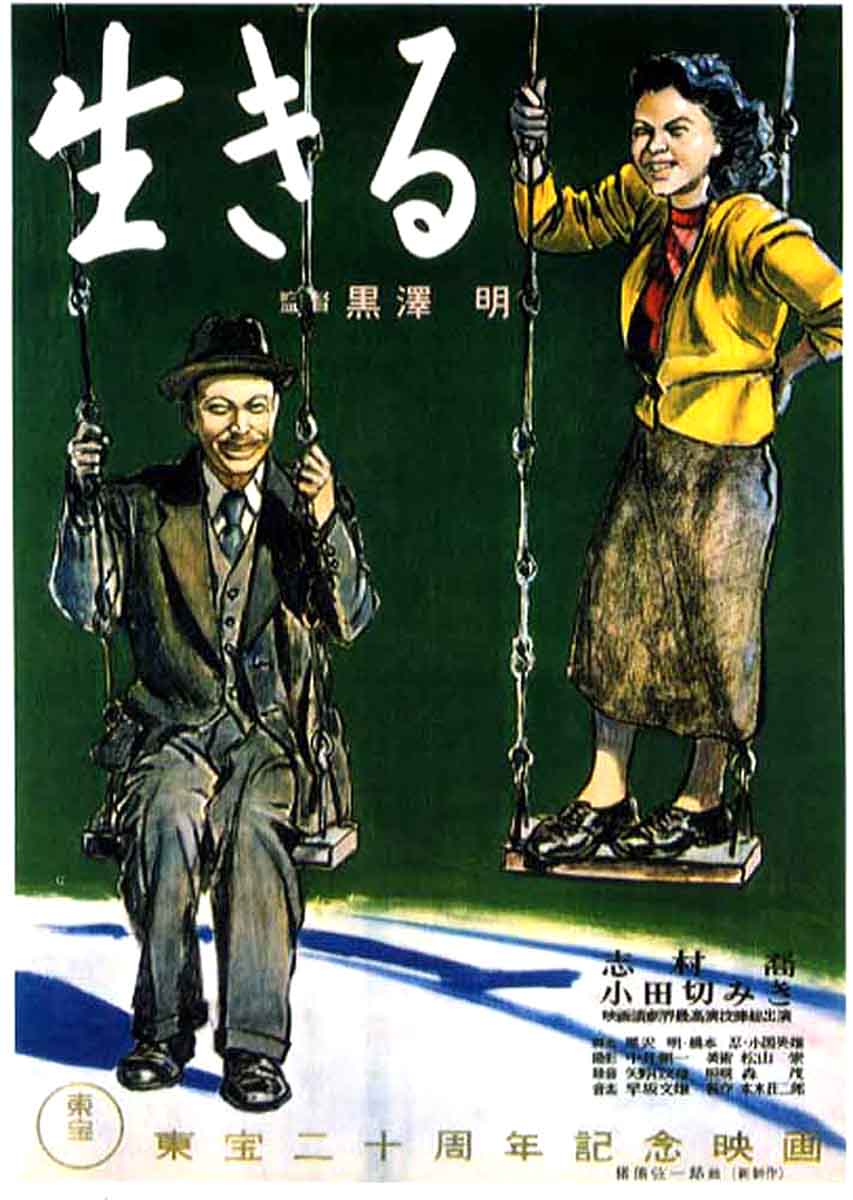
Director: Akira Kurosawa (1952, Japanese, 143 mins)
Reviews: RottenTomatoes (100%), IMDB (8.4), Wikipedia, Amazon, Roger Ebert.
Watch online: Hulu.
Similar movies: city life, death, illness, old age.
Summary: Fabulous movie. One of my all time favorites. The story revolves around Watanabe, a city bureaucrat who has lived a purposeless, listless life for over three decades, pushing paper around. Suddenly, he discovers that he has stomach cancer, so he has about six months to live. He is rattled. He doesn't know what to do. Drink? Spend time with women? Relive his youth? What will give him peace of mind? Is 'khao, piyo, aish karo' the right approach? Or is Leo Tolstoy's short story 'The Three Questions' the right approach? As the movie progresses, Watanabe discovers his answers and comes alive :) Cinematography, acting, story development, the theme - everything is superb.
The structure of the movie is quite unique. There are two distinct parts. In the first part, time moves forward chronologically. In this part, Watanabe discovers that he has stomach cancer and looks for answers. The last scene in the first part is in a restaurant where Watanabe has an intense and honest discussion with a younger female friend on what he should do! He suddenly hits upon an idea. Within seconds of his aha! moment, he starts alighting a staircase while a 'Happy Birthday' song plays in the background.
When the second part of the movie starts, Watanabe has died and people have come to pay their respects. It is at this point that people put together Watanabe's story, discussing how he changed in the last few months of his life. This is a long scene with many flashbacks.

Director: Akira Kurosawa (1954, Japanese, 207 mins)
Reviews: RottenTomatoes (100%), IMDB (8.8), Wikipedia, Amazon, Roger Ebert.
Watch online: Hulu.
Similar movies: war.
Summary: Yet to write.
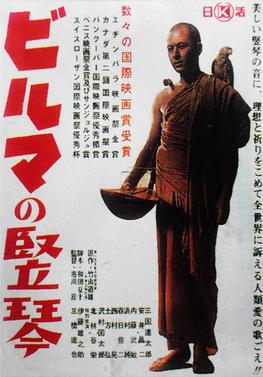
Director: Ron Ichikawa (1956, Japanese, 116 mins)
Reviews: RottenTomatoes (91%), IMDB (8.0), Wikipedia, Amazon.
Watch online: YouTube.
Summary: Yet to write.

Director: Akira Kurosawa (1957, Japanese, 110 mins)
Reviews: RottenTomatoes (97%), IMDB (8.2), Wikipedia, Amazon.
Similar movies: .
Summary: Yet to write.

Director: Keisuke Kinoshita (1958, Japanese, 98 mins)
Reviews: RottenTomatoes (100%), IMDB (7.9), Wikipedia, Amazon, Roger Ebert.
Similar movies: death, family, intense.
Summary: Yet to write.
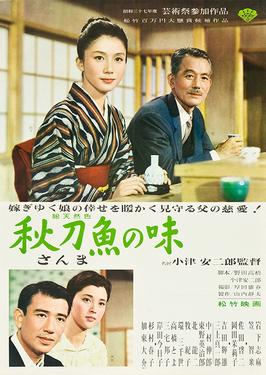
Director: Yasujiro Ozu (1962, Japanese, 112 mins)
Reviews: RottenTomatoes (92%), IMDB (8.1), Wikipedia, Amazon, Roger Ebert.
Similar movies: family.
Summary: Yet to write.

Director: Akira Kurosawa (1963, Japanese, 143 mins)
Reviews: RottenTomatoes (93%), IMDB (8.3), Wikipedia, Amazon.
Similar movies: suspense.
Summary: Yet to write.

Director: Hiroshi Teshigahara (1964, Japanese, 123 mins)
Reviews: RottenTomatoes (100%), IMDB (8.3), Wikipedia, Amazon, Roger Ebert.
Watch online: YouTube.
Similar movies: .
Summary: Yet to write.
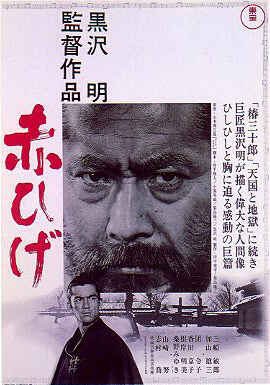
Director: Akira Kurosawa (1965, Japanese, 185 mins)
Reviews: RottenTomatoes (75%), IMDB (8.2), Wikipedia, Amazon, Roger Ebert.
Similar movies: illness.
Summary: Yet to write.
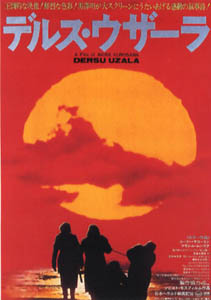
Director: Akira Kurosawa (1975, Japanese, 144 mins)
Reviews: RottenTomatoes (75%), IMDB (8.2), Wikipedia, Amazon.
Similar movies: old age.
Summary: Yet to write.

Director: Hayao Miyazaki (1979, Japanese, 102 mins)
Reviews: RottenTomatoes (90%), IMDB (7.8), Wikipedia, Amazon.
Watch online: Hulu, WatchAnimeMovie.
Similar movies: anime, joyful.
Summary: A James Bond style movie! Fast paced, dramatic, creative and comical. A unique movie by Miyazaki.
Director: Akira Kurosawa (1980, Japanese, 162 mins)
Reviews: RottenTomatoes (86%), IMDB (8.0), Wikipedia, Amazon, Roger Ebert.
Similar movies: .
Summary: Yet to write.

Director: Isao Takahata (1982, Japanese, 60 mins)
Reviews: RottenTomatoes (59%), IMDB (7.0), Wikipedia, Amazon.
Watch online: WatchAnimeMovie.
Similar movies: anime.
Summary: A cute story of a young cellist named Gauche who must practice hard for an upcoming concert. The conductor picks on him repeatedly because his performance is not hundred per cent. On successive nights, Gauche is visited by talking animals: a cat, a cuckoo, a raccoon and a mouse. They bow to Gauche and implore him to teach them various aspects of music. In reality, the animals are teaching him! :) Gauche realizes this much later and feels sorry for having been so haughty and so unkind to most of the animals. The story has a beautiful message and would appeal to young children.
Personally, I connect with this movie as follows: when I am sharing my knowledge with somebody, am I really a teacher? Or am I a student? It's not obvious.
This movie helped me discover Kenji Miyazawa (1896 - 1933), an acclaimed Japanese short story writer. Would love to read his works in English. For example, Once and Forever.
detailed synopsis at Nausicaa.Net.

Director: Hayao Miyazaki (1984, Japanese, 117 mins)
Reviews: RottenTomatoes (83%), IMDB (8.1), Wikipedia, Amazon.
Similar movies: anime.
Summary: A movie with a message: humans must stop fighting and polluting the environment. We must live in harmony with each other and with the elements of nature. Miyazaki has strong female characters in most of his movies. In this movie, it is Princess Nausicaa, who is compassionate, brave and skillful. She represents peace. Good movie for kids, with hundreds of positive Amazon reviews.
Nausicaa of the Valley of the Wind (1985) is a precursor to Princess Mononoke (1997). Both movies are fast paced, with warlike scenes and concern for the environment. Nausicaa of the Valley of the Wind is for younger kids. Princess Mononoke is for older kids.
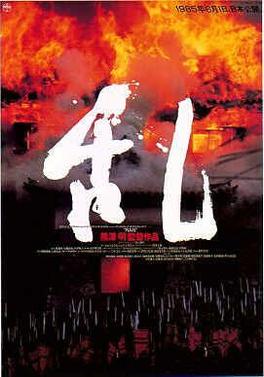
Director: Akira Kurosawa (1985, Japanese, 162 mins)
Reviews: RottenTomatoes (97%), IMDB (8.3), Wikipedia, Amazon, Roger Ebert.
Similar movies: war.
Summary: Yet to write.

Director: Hayao Miyazaki (1986, Japanese, 124 mins)
Reviews: RottenTomatoes (94%), IMDB (8.1), Wikipedia, Amazon.
Watch online: WatchAnimeMovie.
Similar movies: anime, joyful.
Summary: An engaging movie by Miyazaki. A thriller that reminds me of his earlier movie The Castle of Cagliostro, which was a James Bond style movie.

Director: Isao Takahata (1988, Japanese, 89 mins)
Reviews: RottenTomatoes (97%), IMDB (8.4), Wikipedia, Amazon, Roger Ebert.
Watch online: WatchAnimeMovie.
Similar movies: anime, death, depressing, intense, war.
Summary: Yet to write.
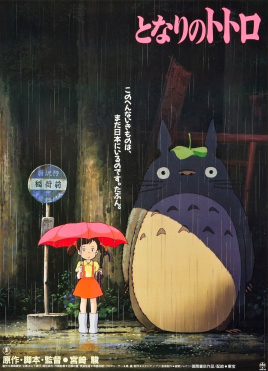
Director: Hayao Miyazaki (1988, Japanese, 86 mins)
Reviews: RottenTomatoes (92%), IMDB (8.2), Wikipedia, Amazon, Roger Ebert.
Watch online: WatchAnimeMovie.
Similar movies: anime, childhood, joyful.
Summary: A lovely movie by Hayao Miyazaki! A father moves with his two young daughters (eight and four) into a house in the woods. The kids spend time with a granny, explore the forest, meet Totoro and eagerly await their mother who is sick in a hospital. Throughout the movie, they are playing around and laughing. There are moments of fear and anxiety too but they are part of routine life. I loved the fearsome looking but benign "Cat Bus". Overall, the more I think of the movie, the happier I feel :)
In both Spirited Away and My Neighbor Totoro, Miyazaki blends real life with fantasy very smoothly. They made me think: what is real and what is imaginary in the experience of a child? Everything is magic!
Roger Ebert's rave review is insightful. He contrasts American anime with Japanese anime. Worth reading.
My Neighbor Totoro is among the 50 Films You Should See By the Age of 14, a list made by British Film Institute in 2005 after consulting 70 experts.

Director: Hayao Miyazaki (1989, Japanese, 103 mins)
Reviews: RottenTomatoes (25%), IMDB (7.9), Wikipedia, Amazon.
Watch online: WatchAnimeMovie.
Similar movies: anime, childhood, joyful.
Summary: A heartwarming movie by Hayao Miyazaki. There are no villains. Everybody is kind hearted. The story is centered around Kiki, a witch with a broom. She also has a companion: a black cat named Jiji.
At age 13, tradition demands that Kiki become independent and get settled in another town. She is excited! She flies afar to a town that looks like San Francisco. Soon, she is accepted by good people and given a room to stay in a bakery shop. There she takes up the job of package delivery. Her job is well suited for her; she leverages her flying skills! Package delivery leads to adventures and encounters with interesting people. She also starts developing a friendship with Tombo, a teenage boy who likes her.
As the movie progresses, Kiki's spirit goes through highs and lows. At one point, when her spirit is sagging, she loses her power to fly! Her skills are revived through help by Ursula, an artist friend who happily lives in the woods by herself. Ursula explains her that ups and downs are normal. She mentions techniques that she employs to revive herself when she is feeling low and cannot paint any more. The final scene shows a recharged Kiki saving Tombo in mid-air in a dramatic closing sequence.
On the whole, a lovely movie. Highly recommended for kids.
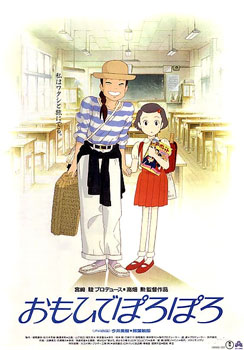
Director: Isao Takahata (1991, Japanese, 118 mins)
Reviews: RottenTomatoes (100%), IMDB (7.7), Wikipedia, Amazon.
Similar movies: anime, joyful, romance.
Summary: A lovely movie: calm and gentle like a steady stream. With comedy, nostalgia and romance packaged together into a wonderful work of art.
The story revolves around a 27-year old girl Taeko. She starts remembering her childhood, when she was nine or ten. There is no 'cat bus', no mythical creatures, no fantasy. It's real and simple. In fact, the beauty of the movie lies in its simplicity. It reminds me of movies like 'An Autumn Afternoon' by Yasujiro Ozu.
Details: Taeko is an unmarried city girl with a busy but boring life. She makes a trip to the countryside. During the trip, she starts remembering seemingly mundane events from her childhood: how she was picky and didn't like certain foods, how she had quarrels with her sisters over bags and clothes, how she was awed by big bathhouses, what happened when girls of her age started getting their periods, how her dad didn't let her participate in drama because it wasn't perceived as a good line of work, how her dad slapped her the only time in her life, how she developed feelings for a boy for the first time, how she had a difficult time understanding division of a fraction by another fraction, how she continued to feel guilty at being unkind and rejectful towards a boy who sat next to her for several months, and so on.
Scenes of the past are interleaved with scenes from the present. During her trip to the countryside, Taeko develops a friendship with Toshio, a joyful farmer who loves nature and organic farming. Slowly, Taeko realizes that her friendship is actually a deep connection because her conversations with Toshio evoke memories from the past, which help her understand herself better. Their connection is sublime. No hugs or kisses.
The movie interleaves the present and the past very well. The transitions are smooth and poetic. The interleaving increases as the movie progresses, culminating in a beautiful end sequence. As Taeko departs from the countryside in a train, she starts wondering whether her happiness lies in a career in the big city or with Toshio in the countryside. "Love knows not its own depth until the hour of separation", as Gibran says. If I close my eyes and imagine, "could I have made the end sequence any better?" Not at all. "Could I have even conceived of it?" No. The end sequence is a gem.
All in all, the movie narrates a story of self realization - what makes us truly happy? And it reminds me of creeks and forests. The most endearing conversations that I remember from my hikes centered around memories from childhood
Good review — Another good review.
Watch online: Part I — Part II — Part III — Other choices.
The closing sequence plays the song Ai wa hana, kimi wa sono tane by Miyako Harumi. The song is a Japanese version of "The Rose" by Amanda McBroom:
THE ROSE by Amanda McBroomSome say love, it is a river that drowns the tender reed.
Some say love, it is a razor that leaves your soul to bleed.
Some say love, it is a hunger, an endless aching need.
I say love, it is a flower, and you its only seed.
It's the heart, afraid of breaking, that never learns to dance.
It's the dream, afraid of waking, that never takes a chance.
It's the one who won't be taken, who cannot seem to give.
And the soul, afraid of dyin', that never learns to live.
When the night has been too lonely, and the road has been too long,
And you think that love is only for the lucky and the strong,
Just remember in the winter far beneath the bitter snows,
Lies the seed, that with the sun's love, in the spring becomes The Rose.
Somehow, I feel that the Western style of singing doesn't do justice to these lyrics. My ears are attuned to warmth and gentleness of Indian classical singers like Lata Mangeshkar, S P Balasubramaniam and Hari Haran. Anyhow, the best version on YouTube that I could discover is by Amanda McBroom herself.
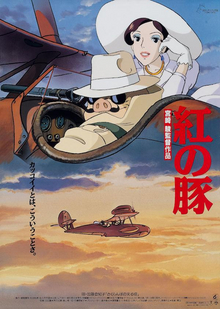
Director: Hayao Miyazaki (1992, Japanese, 94 mins)
Reviews: RottenTomatoes (100%), IMDB (7.8), Wikipedia, Amazon.
Watch online: WatchAnimeMovie.
Similar movies: adventure, anime, joyful.
Summary: Awesome movie! Like a Tintin comic :) Porco is an ace fighter pilot who lives life with gay abandon. He has the face of a pig. He rides a bright red plane and fights sea pirates. He doesn't realize that he's genuinely loved by many, including a long time woman friend of hers, and a young girl engineer who idolizes him. Lovely movie with fighter planes, pirates and comic gangsters.
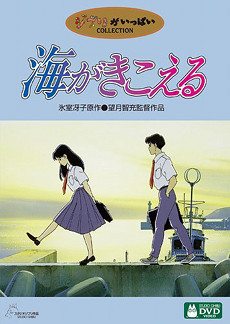
Director: Tomomi Mochizuki (1993, Japanese, 72 mins)
Reviews: RottenTomatoes (N/A), IMDB (7.0), Wikipedia, Amazon.
Similar movies: anime, romance, separation.
Summary: A lovely movie with a deceptively simple story. Critics call this an underrated movie from Studio Ghibli. Never dubbed in English; relatively unknown in the West. I loved watching it.
Two friends are attracted to the same girl who just got transferred to their school. One friend realizes quickly about his attraction, the other does not. The girl is pretty, excels in academics, is outspoken but rude. She consciously stays away from any social interaction. She has hardly a friend. Slowly, it emerges that her mom has moved to a new city; her parents are getting separated. She loves both parents and is conflicted. For example, when it is time to graduate, she starts applying to colleges in both cities.

Director: Isao Takahata (1994, Japanese, 119 mins)
Reviews: RottenTomatoes (83%), IMDB (7.4), Wikipedia, Amazon.
Watch online: WatchAnimeMovie.
Similar movies: anime.
Summary: Storyline: Development of human cities results in deforestation, which leaves many raccoons homeless. They try various tactics to help humans understand their plight, so that they stop building their cities. In Japanese folklore, raccoons have shape shifting abilities. They can transform into objects and other living creatures. However, such transformation techniques require focus and energy. They may be learnt only from reknowned teachers, who have spent lifetimes mastering them.
Most of the movie is fun, but not all. There are some scary and violent scenes when raccoons try grotesque techniques to stop humans. These scenes made the movie incongruous to me. Why? Shape shifting teachers in the movie look like experienced martial artists. Eastern martial arts traditions emphasize peace. They avoid the use of force unless really necessary.
A mellower movie with a more cogent storyline would have been more attractive. The silver lining is that kids who watch this movie will learn that urbanization impacts those who dwell in forests. So we should be mindful of expansion and increased consumption.
Is Pom Poko Suitable For Children? is a nicely written article.

Director: Yoshifumi Kondo (1995, Japanese, 111 mins)
Reviews: RottenTomatoes (90%), IMDB (7.9), Wikipedia, Amazon.
Watch online: WatchAnimeMovie.
Similar movies: anime, childhood, joyful, romance.
Summary: Whisper of the Heart is a lovely movie about two teenage students falling in love with each other. Screenplay is by the famous Japanese director Hayao Miyazaki. No symbolism, no message. Simple, lighthearted movie that made me smile. If you loved somebody and your feelings were reciprocated, then this movie will remind you of those special, magic moments :)

Director: Masayuki Suo (1996, Japanese, 136 mins)
Reviews: RottenTomatoes (91%), IMDB (7.7), Wikipedia, Amazon, Roger Ebert.
Watch online: NetFlix.
Similar movies: family, romance.
Summary: A successful but bored accountant in Tokyo is enamored by a beautiful woman gazing out of a dance studio window. Dancing and public display of affection are shameful in Japanese society. But his desire to meet the woman propels him to break societal norms. He starts taking lessons for western dance styles like waltz. He hides his new found passion from his wife and teenage daughter. Soon, his attraction for the woman in the dance studio becomes secondary and he starts enjoying dance for its own sake. It brings him great joy and freedom.
The movie is not a classic but lovely. What's lovely? Each character in the story: the worker, his wife, his daughter, his dance teacher, the girl he is attracted to, his office colleague and a private detective — each person is kind hearted and forgiving.
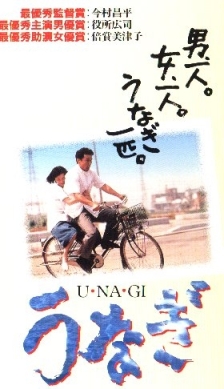
Director: Shohei Imamura (1997, Japanese, 117 mins)
Reviews: RottenTomatoes (77%), IMDB (7.4), Wikipedia, Amazon.
Watch online: YouTube.
Similar movies: .
Summary: Yet to write.

Director: Hayao Miyazaki (1997, Japanese, 134 mins)
Reviews: RottenTomatoes (93%), IMDB (8.4), Wikipedia, Amazon, Roger Ebert.
Watch online: WatchAnimeMovie.
Similar movies: anime.
Summary: A picturesque epic drawn on a large canvas. Fast paced, action packed drama with battles between gods, humans and animals.
Princess Mononoke has many themes. A prominent theme is the struggle between nature and man as industrialization encroaches upon forests. Another theme is equality between men and women, with women leading industrialization. For me, the loveliest theme was the struggle between hatred and forgiveness. In many movies, if somebody is angry or has caused devastation, a hero wipes them out, so that evil is destroyed. Princess Mononoke has a different flavor. I would say that it is more holistic, that we are all interconnected. Somebody else's misery is ours collectively.
In the very first scene, a wild boar attacks a village. The boar has become a demon imbued with anger and hatred. Prince Ashitaka kills the boar. After his death, village folk collect around the boar and offer their prayers so that the spirit of the boar becomes calm and peaceful, so that it stops suffering from anger and hatred. The anger and hatred of the boar is not limited to the boar alone - it spreads to whosoever comes in touch with it -- physically or mentally. For example, with the killing, Prince Ashitaka is now cursed - he shall become a super human warrior but die soon, as his wounds deepen. Later in the movie, it is discovered that the boar had become a demon because a piece of metal was lodged inside it. That piece of metal was a bullet that came from an iron factory made by humans. Overall, the movie has an element of togetherness with everything around us. We are not separate from the boar, the forest and the gods.
This movie reminds me of a wonderful story book for children called The Legend of the Bluebonnets.
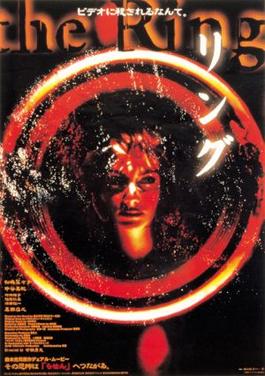
Director: Hideo Nakata (1998, Japanese, 96 mins)
Reviews: RottenTomatoes (97%), IMDB (7.3), Wikipedia, Amazon.
Similar movies: horror, suspense.
Summary: Yet to write.

Director: Isao Takahata (1999, Japanese, 104 mins)
Reviews: RottenTomatoes (71%), IMDB (7.2), Wikipedia, Amazon.
Similar movies: anime, family, joyful.
Summary: A comedy anime movie by Isao Takahata. Minimalistic hand drawn cartoons. Some beautiful scenes showcasing conflict and love among all members of a family. The movie does not have a story. It is a series of short scenes showing various aspects of the family. The last fifteen minutes seemed long drawn to me. Overall, a watchable movie.

Director: Hayao Miyazaki (2001, Japanese, 125 mins)
Reviews: RottenTomatoes (97%), IMDB (8.6), Wikipedia, Amazon, Roger Ebert.
Similar movies: anime, childhood.
Summary: Spirited Away won the Oscar for Best Anime Movie in 2002. I was struck by the imagination that crafted the story and the myriad ghostly creatures in it. The cutest character is a walking lamppost that appears for less than a minute :) Miyazaki made this movie specifically for 10-year old girls. Some Western parents find it frightening because ten year old Chihiro is transported into the spirit world when she's awake (not dreaming) and her parents turn into pigs. Roger Ebert wrote a glowing review.
The closing song of the movie is beautiful: Itsumo Nando Demo. Lyrics (with English translation): here. The song has an official English version.
Itsumo Nando Demo by Youmi KimuraSomewhere, a voice calls, in the depths of my heart.
May I always be dreaming, the dreams that move my heart.
So many tears of sadness, uncountable through and through.
I know on the other side of them, I'll find you.
Everytime we fall down to the ground, we look up to the blue sky above.
We wake to its blueness, as for the first time.
Though the road is long and lonely and the end far away, out of sight.
I can with these two arms embrace the light.
As I bid farewell my heart stops, in tenderness I feel
My silent empty body begins to listen to what is real.
The wonder of living, the wonder of dying,
The wind, town, and flowers, we all dance one unity.
Somewhere a voice calls in the depths of my heart.
"Leep dreaming your dreams, don't ever let them part".
Why speak of all your sadness or of life's painfull woes?
Instead, let the same lips sing a gentle song for you.
The whispering voice, we never want to forget,
in each passing memory always there to guide you.
When a miror has been broken, shattered pieces scattered on the ground,
Glimpses of new life, reflected all around.
Window of beginning, stillness, new light of the dawn,
Let my silent, empty body be filled and reborn.
No need to search outside, nor sail across the sea
Cause here shining inside me, it's right here inside me.
I've found a brightness, it's always with me.

Director: Hiroyuki Morita (2002, Japanese, 75 mins)
Reviews: RottenTomatoes (94%), IMDB (7.2), Wikipedia, Amazon.
Watch online: WatchAnimeMovie.
Similar movies: anime, joyful.
Summary: A young girl has the ability to talk to cats. When she saves a cat from being hit by a truck, her life changes. Cats visit her and transport her into a kingdom of cats whose king wants her married to the prince :) A watchable, entertaining movie made by Studio Ghibli.

Director: Kitaro Kosaka (2003, Japanese, 47 mins)
Reviews: RottenTomatoes (59%), IMDB (7.0), Wikipedia, Amazon.
Watch online: YouTube.
Similar movies: anime.
Summary: A professional Spanish cyclist Pepe Benengeli competes in a bicycle race in his hometown in Andalusia. The race is on the same day that his former his former girlfriend is getting married to his brother. Even though he is quite upset, Pepes is loved and supported throughout the race by his extended family, including his brother and his fiancee.
Pepe is originally meant to be a backup racer whose job is to assist his more prominent teammate to win. During the race, he accidentally overhears a conversation that his sponsor intends to fire him after the race. Realizing that he may not find another team for the next season and that he has nothing left to lose, he disregards his instructions and sets out to win the race for himself.
I loved the festive mood, the joyful music, the drama leading to the photo finish, and the inanity of it all :)And I loved the last scene, where Pepe shows his sponsors how to eat a pickled eggplant, a specialty of his hometown.
The movie was recommended by Anime Movie Guide, which is a comprehensive guide to Japanese anime movies.

Director: Hayao Miyazaki (2004, Japanese, 119 mins)
Reviews: RottenTomatoes (87%), IMDB (8.2), Wikipedia, Amazon.
Watch online: WatchAnimeMovie.
Similar movies: anime.
Summary: A dreamy movie. It confused my logical mind. I have to see it again. Like all Miyazaki movies, there is a strong female character, anti-war sentiments, and magic! The first scene shows a clunky, battleship style "castle" that barely holds itself together. It walks on chicken legs. Inside the castle, there is a normal looking house with many doors. I loved that different doors leads to totally different worlds! :) One door opens to a world of fighter planes, bombs and war. Another door opens to a street in a quaint town. Another door opens to expansive landscapes with mountains, rivers and valleys with abundant flowers. Yet another door opens to a dreary, cold environment.
The visuals are rich, most of which are hand drawn. I was delighted to enter a world of magic, spells and wizards! Totally awesome! Very liberating
This movie has a weak storyline. I understood the movie better with two insightful comments on Amazon: First comment — Second comment.
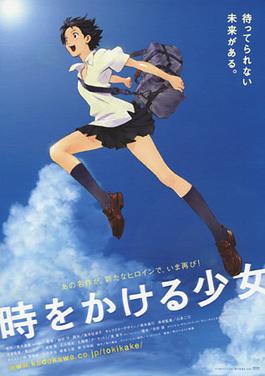
Director: Mamoru Hosoda (2006, Japanese, 98 mins)
Reviews: RottenTomatoes (87%), IMDB (7.8), Wikipedia, Amazon.
Watch online: YouTube, WatchAnimeMovie.
Similar movies: anime, romance.
Summary: An entertaining movie. A teenage girl Makoto discovers that she can go back in the past. She starts using this ability to fix small things in her life: eat a pudding before sister eats it, avoid socially embarrassing situations, fix relationships between others and her own, and so on. For the first hour or so, I got increasingly tired.. I was thinking, "oh, boy! yet another teenage romance movie.." Then suddenly, time stopped .. everything came to a standstill and the storyline took a turn. The scene in which time stops is nicely done. Makoto discovers why she is time traveling. She also discovers purpose in her life: to serve others, keeping the future in mind.
Comparisons with Groundhog Day (1993, English) are natural. In Groundhog Day, the protagonist does not have control over time travel. Every day, he wakes up to the same date and events unfold in more or less the same way. This repetition does not go away until he makes peace with a certain woman through changing his own behavior. The storyline reminds me of rebirth in Indian philosophy, or the general idea that we face the same situation again and again until we recognize our own habit patterns of negative reactions and fix these habit patterns to become peaceful.
About Time (2013, English) is a copy of The Girl Who Leapt Through Time. I saw it a few weeks ago and found it very boring. The Japanese movie resonated much more with me.
An insightful review tracing the history of time travel genre in Japanese culture: here.
Director: Keiichi Hara (2007, Japanese, 138 mins)
Reviews: RottenTomatoes (N/A), IMDB (7.4), Wikipedia, Amazon.
Similar movies: anime, family.
Summary: The central character in the movie is a "kappa" who is taken care of by a family in Japan. Kappas are Japanese mythical creatures. They are small sized, with frog like features and stand upright like humans. A kappa's father is killed in the Edo era. Immediately thereafter, there is an earthquake and the kappa falls into a giant crack in earth. Hundreds of years later, a Japanese boy breaks open the shell that held the kappa together, bringing him to life! The movie shows how the boy's family adopts the kappa, what happens when the world learns of its existence, the boy's friendship with a girl who is rejected by everybody else, and what happens to the kappa eventually. There are reflections on death, reverence for ancestors and a critique of modern lifestyle that wipes out natural dwellings of other creatures.
On the whole, a beautiful movie! Aimed at older kids and adults. A tad slow at a few places and long at 138 mins. Storyline is excellent, there are no loose threads.
The movie is relatively unknown in the West. Amazon doesn't even have a DVD. A good review is here.
Watch online: English sub-titles — other choices. The sub-titles are high quality. When a reference to Japanese towns or mythical creatures comes up, there is an explanation of what that word means in full sentences.

Director: Makoto Shinkai (2007, Japanese, 63 mins)
Reviews: RottenTomatoes (N/A), IMDB (7.9), Wikipedia, Amazon.
Watch online: YouTube, WatchAnimeMovie.
Similar movies: anime, depressing.
Summary:
A pensive story of a young couple that grows apart over time. The movie is slow but delightfully artistic. The opening dialogues of the movie explain the title:"They say it's five centimeters per second."
"What do you mean?"
"The speed at which the sakura blossom petals fall... Five centimeters per second."
The sakura tree (cherry blossom) is a Japanese national symbol of how fleeting life and beauty can be. It is a gorgeous tree that blooms in spring. Briefly. The petals hold fast to their branches for only a few days. The Japanese eagerly await these days because they indulge in festivities when the sakura trees blossom. The significance of cherry blossoms in Japanese culture is captured very well by a passage at Bon Appetit's Blog.
The movie has three chapters. Chapter I was awesome! It shows how fervently the couple keeps in touch despite physical distance, and their last meeting. Chapter II and III are good too.
An Amazon reviewer summarized the movie as follows:
"The sakura petals are like us, falling from the tree of life. As we fall, we encounter all sorts of people. There will be people who we will fall in love with. However by the time the petals (us) reach the ground we don't know who will be beside us."
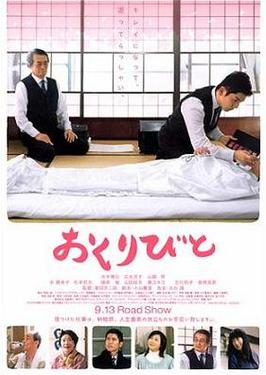
Director: Yôjirô Takita (2008, Japanese, 130 mins)
Reviews: RottenTomatoes (81%), IMDB (8.1), Wikipedia, Amazon, Roger Ebert.
Watch online: YouTube.
Similar movies: death, intense.
Summary: The movie won the Oscar for Best Foreign Film in 2009. Heavy, poignant but great.
Plot: A cellist loses his job. Through a quirk of fate, he takes up the job of performing the last rites for those who just died. It involves cleaning the body, decorating it and placing it a coffin. These rituals are performed with great love and respect for the departed.
While watching the movie, at one point, I imagined that many of the people I know are no more. I was surprised at who popped up in my memory :) At another point, I remembered physical objects that I have kept with myself as memories of people I know. These are some of my attachments.
The movie interweaves multiple threads in the cellist's life: his wife, his friends, his mom who is no more and his dad who abandoned the family many years ago. The ending is beautiful. Highly recommended.

Director: Hayao Miyazaki (2010, Japanese, 101 mins)
Reviews: RottenTomatoes (92%), IMDB (7.7), Wikipedia, Amazon.
Watch online: WatchAnimeMovie.
Similar movies: anime, joyful.
Summary: A cute story of a goldfish who wants to become a human. Nicely done. Good movie for young kids.
Storyline: A goldfish escapes the ocean and is saved by a five year old boy named Sōsuke, who names her Ponyo. The scenes in which Sōsuke takes care of the goldfish are moving. They fall in love with each other (not romantic love but innocent child-like love). Ponyo is endowed with supernatural powers. She decides that she wants to be a human and turns into a five year old girl. Her father sweeps her back into the ocean because he is afraid that Ponyo could upset the balance of nature with her abilities by becoming human. Ponyo escapes again to be with Sōsuke.
On the whole, I loved the movie for its creativity and the screenplay. Worth watching!

Director: Hiromasa Yonebayashi (2010, Japanese, 94 mins)
Reviews: RottenTomatoes (94%), IMDB (7.6), Wikipedia, Amazon.
Similar movies: anime.
Summary: A charming movie. Good for kids. Arrietty is a young girl among the "borrowers". These are tiny people who live secretly in walls and holes of a normal house but hidden from human eyes. They borrow items from humans. Arrietty strikes a friendship with a gentle and compassionate human boy Sho. A lovely story that kept me engaged throughout.
Original Japanese movie "The Borrower Arrietty" with English sub-titles: here — other options. Two years later, an English version of the movie was released: "The Secret World of Arrietty".
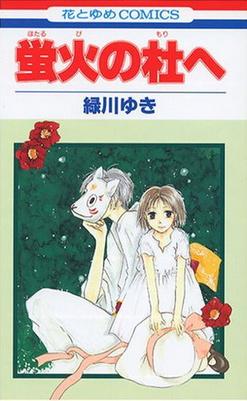
Director: Takahiro Ômori (2011, Japanese, 45 mins)
Reviews: RottenTomatoes (N/A), IMDB (7.7), Wikipedia, Amazon.
Watch online: YouTube, WatchAnimeMovie.
Similar movies: anime, romance, separation.
Summary: A touching story of friendship between Hotaru and Gin. At the age of six, Hotaru is lost in a forest near her grandfather's home in the countryside. She is rescued by Gin, a forest spirit that never ages. He looks like a young man and almost always wears a mask. The twist in the plot: if Gin ever touches a human, it will cause him to disappear forever. Hotaru returns every summer to meet Gin, who eagerly awaits her return. As Hotaru grows into a young woman, their friendship becomes romantic and limitations emerge. For example, she wants to "glomp" Gin but can't. Overall, a watchable movie showcasing romance with a twist. Background music is good.
I discovered this movie at Anime Movie Guide, which reviews all Japanese anime movies worth watching.
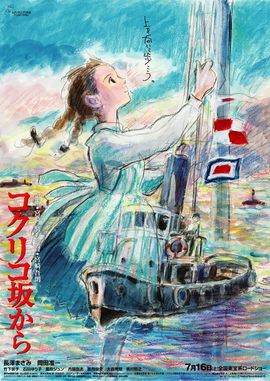
Director: Goro Miyazaki (2011, Japanese, 91 mins)
Reviews: RottenTomatoes (83%), IMDB (7.3), Wikipedia, Amazon, Roger Ebert.
Similar movies: anime, joyful, romance.
Summary: A lovely movie made by Hayao Miyazaki's son. What I liked was the fluidity - everything is natural, people are good hearted and there's no melodrama. Like the movie 'Whisper of the Heart' but with a twist that gets resolved in the end.
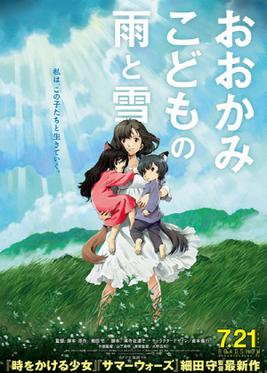
Director: Mamoru Hosoda (2012, Japanese, 117 mins)
Reviews: RottenTomatoes (92%), IMDB (8.0), Wikipedia, Amazon.
Watch online: WatchAnimeMovie.
Similar movies: anime, childhood, intense.
Summary: A sentimental, saddish movie. A woman falls in love with a "wolf man" who dies soon after their kids are born. So she singlehandedly raises her two "wolf children" who transform into wolves at will. When her kids are toddlers, she goes to great extremes to hide them from human eyes while continuing to live in a city. At age five, the kids become self aware and start inter-mingling with humans, carefully hiding their extraordinary abilities. By age twelve, one kid prefers to blend into humans. The other decides to stand out and live the life of a lone wolf.
Overall, the movie shows the struggles of a single mom, and the process of her kids figuring out their true calling as they grow up. I found the plot strange (somewhat repulsive too) but creative. Character development is awesome and the challenges faced by each individual are quite "real". A bit long and with a few melodramatic scenes that could have been deleted. Overall, the movie is artistic and worth watching.

Director: Kunio Katô (2008, Japanese, 12 mins)
Reviews: RottenTomatoes (51%), IMDB (8.2), Wikipedia.
Watch online: YouTube.
Similar movies: anime, short, silent.
Summary: The movie won the Oscar for Best Animation Film in 2012.
An old man lives on the top floor of a tall building that is mostly submerged in water. As the water level rises, he builds another level to stay above water. One day, his favorite pipe falls into the water. He goes scuba diving to search for the pipe. Each room in the building reminds him of fond memories associated with that room.


